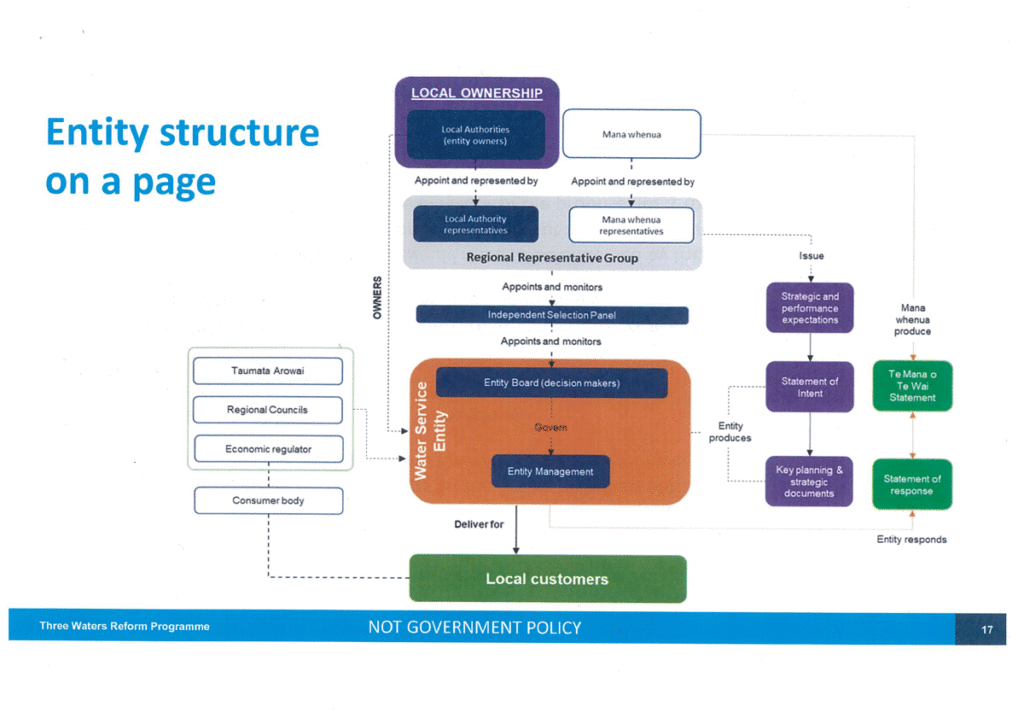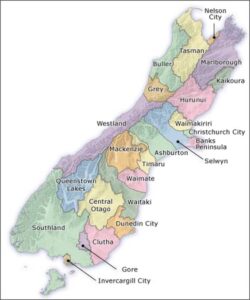Slowly it’s starting to be realized by people that the soft soaping by the Government advertising how they have a plan for water isn’t the real story.
We’re organizing a public meeting on water:
We have decided that it’s important that ordinary voters have a chance to hear from a group of speakers about what precisely the water reforms are all about.
The Tuesday club will be hosting a public meeting on water and have invited a range of speakers from several councils. So, write in your diaries the date of Wednesday the 18th of August at 7:00 PM. Venue to be confirmed.
We have invited the chairs of the of the infrastructure committees of Christchurch City Council, Dunedin City Council, and Invercargill City Council and Eugenie Sage
There will be more details available next week. However, we’d like you to advertise this public meeting on water through whatever medium you desire.
Let us reconsider what is being proposed by Central Government:
1 Christchurch City Council currently has $6.9 billion with of water assets with $1.1 billion worth of debt. It has been proposed by central government that these assets will be taken from the council and put into an organization which covers most of the South Island. CCC will receive $122m as a sweetener. I repeat what I wrote last week. This is theft by Central Government. Thirty pieces of silver comes to mind.
2. Here is the proposed structure for the new entity:


3. The method of establishing this new structure is ill defined and will lead to massive disputes within local government in the South Island. All the Local Authorities, bar in the north of the South Island, will be in one structure. Here’s the map of the Local Authorities covered by this proposal.
4. Responsibility for water will be removed from all Local Authorities, including Christchurch City Council.
5. It worries me greatly that there is potential for an unnecessary public over-reaction against Mana Whenua having equal status to the 20 local authorities which is part of this proposed new structure.
I completely support co-governance with Ngai Tahu over our rivers. This is consistent with Article 2 in the Treaty of Waitangi in which Rangatiratanga was confirmed. It reflects the principles of partnership and reciprocity which are well-established in Treaty jurisprudence
I am not so sure about water systems which I think is an Article 3 matter which guarantees all New Zealand citizens are guaranteed equality. Let’s talk about it.
During the week I received very interesting response to my article:
- I received from Rod Cameron this week part of a submission which he and two others made to the NZ Infrastructure Commission re: Aotearoa New Zealand Infrastructure Strategy Consultation Document “He Tūāpapa ki te Ora, Infrastructure for a Better Future”
The document was a large one but there were several parts which relate perfectly to water. They stated:
We see a significant gap, however, which is the prime focus of our submission, that progress in infrastructure delivery and operations cannot be made without first establishing comprehensive information systems and management. These information systems and their management must be based on an agreed ontology, that is a common set of concepts and categories for infrastructure assets that describes both their properties and the relationships between them. This informationbased approach is increasingly being advocated for infrastructure management internationally.
Then they quoted two overseas experts one from USA and the other from GB.
The first wrote:
“The right information on existing assets can allow us to be more effective in what work is carried out and more efficient in how the work is performed. Information gathered, used and shared in a reliable, systematic process is key to effective information management. This creates the opportunity for owners to build and operate buildings and infrastructure in more agile and resilient ways. Consulting with owners and industry, we have formed a consensus view that a shift toward an information management approach is needed for the sector. Owners want to be better informed with reliable data to make more effective decisions — this will support resiliency and agile decisions to improve the designing, building and use of public assets. Roger Grant, ‘Overcoming the ‘information deficit’ for US infrastructure and buildings’, The Hill, 15 July 2021.
The second wrote:
‘In integrated approach to information management – Identifying decisions and the information required for them using activity and process models’. ‘If we are to achieve more from the built environment, it essential that we better understand the information required in its planning, design, construction and management.
Al Cook, Cambridge Centre for Digital Built Britain ‘
If we apply the tests advocated by the submitters and their two overseas experts, the proposed water reforms have been rushed and the amount of information on existing assets is weak. The rush to impose these proposed reforms breaches all the normal ways of planning infrastructure, which must be undertaken in a measured and sensible manner over a long period.
In other words, everybody needs to slow down, and a sensible solution will be identified. If the current proposal is the answer, then somebody is asking the wrong questions.
- . I received another submission which went like this:
I liked your article about water. I think the contention that we will get a better structure is absolute bullshit. Christchurch’s issues result from the National Govt bowing to vested interests (farming) and removing the elected Ecan representatives. They then placed economic reliance on dairying across a landscape that is unsuitable environmentally for dairy farming. The damage done over the last 20 years will cost us more to remediate than the economic gain. These are the same mistakes that civilisation has made over thousands of years, and we do not have the capacity to do anything differently. We think we can but our Neolithic brain won’t allow us. One can read about civilisation failures through history to understand. Scientific knowledge may have improved but our desire for extraction has not. We have set about destroying the natural ecosystem across the Canterbury plains to enable us to pay higher prices for our dairy products.
The other aspect of this is that research has shown that cities do not rely on farming, but successful farming is totally dependent on having successful cities. The water argument therefore is a problem for local urban governance to resolve. Shoddy practices in the hinterland should not be tolerated despite any rhetoric to the contrary. It’s more than a pure economic issue.
A new structure is just a new structure that will over time create more centralised bureaucracy. It runs counter to the localism argument, and it also runs counter to the community’s desires. Running a good water system is about regulation and standards not about centralisation. This is not driven by anything but ideology.
- Just to show that I don’t just read what suits me there is a very good podcast in this link about the three waters reform. https://www.newsroom.co.nz/podcast-card/when-the-government-stirs-the-waters
- Distrust of these reforms aren’t just in the cities:
- “The water system was put in by the people, for the people. It was funded by the local farmers. A few years ago we built a $4m water scheme to treat the water – so if we had to give it away to someone else, I’d feel a wee bit cheated.”
My comment to this is that CCC ratepayers have invested for over a century in our water infrastructure, and it will be taken from us with one vicious move by Central Government. We’re the same as Seddon residents.I also received from a current City Councillor the following questions:
- Identifying and valuing Council land that has infrastructure on it or related to it. More work needs to be done on other assets like stop banks and detention basins.
- The $122M offered to Christchurch in 2024 will be a fund that we need to apply to.
- Big questions about Accountability, Governance details, and responsiveness to the community. How would this work for an independent Entity?
- More financial information about stormwater and land drainage inclusion.
- More information about exactly what will be transferred, including land.
- Debt assumptions How will Christchurch losing $6.9B off its books affect our credit rating?
- What about Community engagement? No detail yet. (Looks like there will not be consultation).
- Proof of the new model actually providing cost reductions and better results from efficiencies of scale.
- Levels of Service that an Entity will maintain a chlorine exemption for Christchurch as a level of service. No Guarantee.
- What will residents pay?
- How will water charges be assessed? By CV or Flat volumetric?
The Government is ramming this proposal through. Most New Zealanders have little, if any, idea about how bad these reforms really are. The Tuesday Club will be focusing on this issue in depth over the next few months. We believe that we need to find a solution where this current proposal is abandoned, and we all work as a country to ensure that from North Cape to Bluff everybody has a safe water system.
Leave a Reply